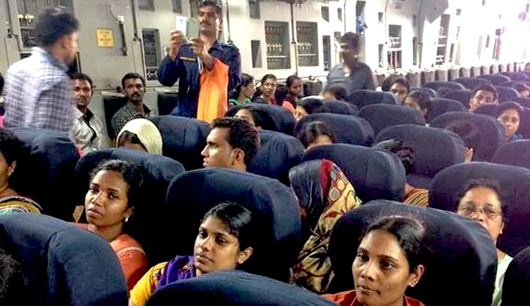Kochi/Mumbai, Apr 2: Two groups of Indian nationals evacuated from strife-torn Yemen landed at Kochi and Mumbai international airports on Thursday morning.
An Indian Air Force plane carrying 168 Indian nationals landed at the Kochi airport at 2 AM, while another C17 Globemaster with 190 onboard landed in Mumbai.

They were part of around 350 Indians who had reached Djibouti after being evacuated on a Navy vessel from Aden, the seaport city of Yemen.
Kochi Arrival
Those that arrived in Kochi at 2 AM, including nurses and workers among others, reached by the special flight--Indian Air Force's C17 Globemasters-- bringing an end to their about a week-long ordeal.
The evacuees were welcomed at the airport by Kerala Minister for Diaspora K C Joseph, PWD Minister Ibrahim Kunju and Ernakulam District Collector M G Rajamanikyam.
Parents of Jincy and Tincy, two nurses working with government hospitals in Yemen, are concerned about their elder daughter whose flight from Sana'a was cancelled even after a boarding pass was issued.
Omana, mother of the nurses, hailing from Vadakkancherry of Palakkad district, said only Jincy, working in Aden, could reach home safely.
"We are happy that our daughter Jincy is coming back on the special flight. But we are concerned about the safety our elder daughter Tincy who is in Sana'a. We hoped that she would also be reaching safely tonight.
"Jincy could not come as the flight did not take off because of the last minute developments at Sana'a airport," said Omana who came to the airport along with her husband Soman to receive their daughters.
A Kerala government official said the Non-Resident Keralites Affairs (Norka) cell would give Rs 2000 each to the people who returned from Yemen at the airport besides providing them free transportation facilities to reach home.
Mumbai Arrival
The flight carrying 190 Indians from Yemen arrived around 3:25 AM at the Chhatrapati Shivaji International Airport here.
Defence sources said that the flight to Mumbai could not take off on time from Djibouti due to the pending paper work of the evacuees.
Many people did not have even their passports with them leading to delay in flight, the sources said.
Maharashtra Tourism and Parliamentary Affairs Minister Prakash Mehta and MP Kirit Somaiya were present the airport to welcome the evacuees.
The Central Railway has offered free-of-cost travelling for the evacuees till their destinations.
The evacuation operation was a very difficult task as not much details were available with the IAF, Wing Commander Vikram Abbi, co-pilot of the flight said.
Abbi said that the crew were told about the rescue operation on March 30 and the flight departed from India yesterday.
One of the evacuees, Mary Amma Vargeese said, she was working as a nurse in a hospital in Aden for past two years. And, one day she suddenly "heard some exploding sound, after which I stopped going to work."
"All the shops were closed, we didn't have food for many days," she said.







Comments
Add new comment